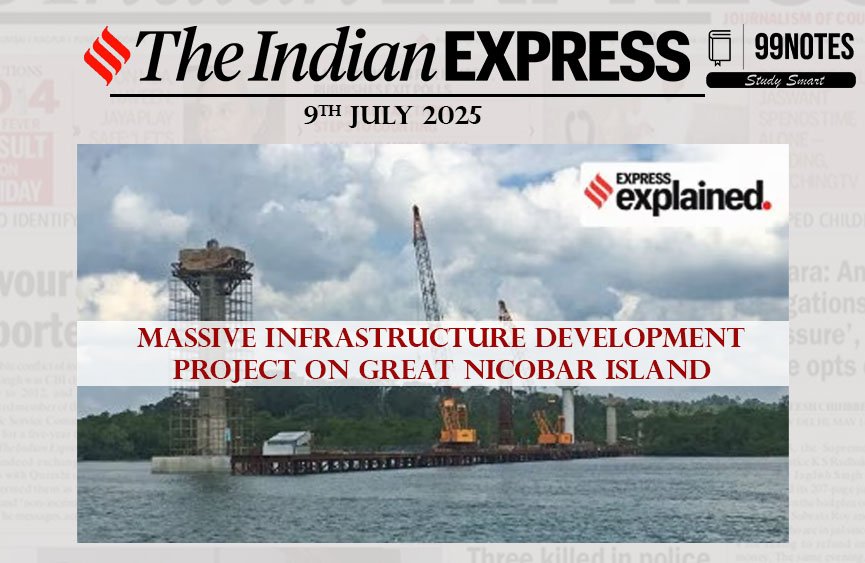09 July 2025: Indian Express Editorial Analysis
1. Address Misgivings
(Source: Editorial Page, The Indian Express)
| Topic: GS2: Governance & Transparency; GS3: Environmental Conservation, Security |
| Context |
|
Strategic Importance of Great Nicobar Island
- The Great Nicobar Island holds vital strategic significance for India due to its location at the southeastern edge of the Indian Ocean, near key global sea lanes.
- With China’s increasing maritime assertiveness, especially by the PLA Navy in the Bay of Bengal, the island is being developed to serve as a bulwark for India’s security in the Indo-Pacific.
Key Infrastructure Projects
- The initiative includes a Transshipment Terminal, a greenfield international airport, township, solar power plant, and logistics hubs.
- The goal is to create a robust military and civilian infrastructure to support India’s strategic interests and improve regional connectivity.
Environmental and Ecological Concerns
- The National Green Tribunal (NGT) directed the Ministry of Environment to re-examine the project’s ecological impact.
- Critics argue the infrastructure push will endanger coral reefs, marine biodiversity, and threatened species like the Nicobar megapode and leatherback turtles.
- The Shompen tribe, a largely uncontacted indigenous group, is at high risk of displacement and cultural loss.
Issues of Transparency and Governance
- The government has kept key environmental clearance reports classified, citing national security.
- The RTI Act has been reportedly misused to deny public access to information, eroding democratic accountability.
- In Parliament and public forums, officials have evaded questions or cited sub judice matters to avoid disclosing project details.
Concerns over Due Process
- There is a growing perception that strategic goals are overshadowing procedural integrity and citizen participation.
- The secrecy surrounding the Wildlife Conservation Plan and lack of engagement with tribal stakeholders raise questions of consent and inclusivity in governance.
Conclusion & Way Forward
- India’s push to fortify its maritime posture in the Indo-Pacific is understandable, but national security should not come at the cost of transparency, ecological balance, and indigenous rights. Strategic objectives must be balanced with democratic accountability, ecological stewardship, and inclusive governance.
- The government should release environmental reports, hold public consultations, and engage civil society and tribal communities in planning.
- A long-term strategy requires building trust—not just infrastructure. Development must not be opaque.
| Practice Question: (GS-2 | 15 Marks | 250 Words)
Strategic development initiatives in ecologically sensitive regions like Great Nicobar must strike a balance between national security and environmental accountability. Discuss the ethical and governance-related challenges involved in such projects. |
Also Read: The Hindu Editorial Analysis- 09 July 2025
2. Old Delhi, New Washington
(Source: Editorial Page, The Indian Express)
| Topic: GS2 (India and its relations with the USA, Foreign Policy), GS3 (International Trade, Security Issues) |
| Context |
|
Understanding Trump’s Foreign Policy Shift
- Trump’s policy of “tariff threats” against allies like Japan and South Korea marked a drastic shift from America’s traditional multilateral diplomacy.
- His actions, including withdrawal from global institutions and transactional foreign policy, signal a rise in US unilateralism driven more by domestic political pressures than strategic imperatives.
- Michael Beckley describes this new US stance as “America as a rogue superpower,” abandoning global stewardship in favor of national self-interest.
The Domestic Forces Behind US Unilateralism
- The editorial cites economic globalization, rising inequality, and demographic pressures as key domestic factors shaping US politics.
- Trump’s policies, including trade wars and immigration curbs, were not isolated moves but part of a broader nationalist agenda rooted in America’s internal divisions.
- The rise of “America First” thinking has redefined US foreign policy through populist, protectionist, and security-centered approaches.
Implications for India’s Foreign Policy
- India cannot afford to be reactive; it needs a clear strategy that understands US domestic compulsions.
- Indian policymakers must engage with a broader range of US actors, beyond just the executive, to safeguard long-term partnership interests.
- The editorial criticizes India’s current foreign policy as too focused on personalities, noting the need to focus more on institutions and long-term interests.
India’s Strategic Response and Resilience
- India has maintained strategic balance despite Trump-era shocks, managing trade, defense, and immigration issues with calm diplomacy.
- India’s recent foreign engagements — with Quad, BRICS, and Global South — reflect a mature multi-alignment strategy that preserves strategic autonomy.
- However, India’s inward-looking tendencies and underinvestment in foreign policy expertise may limit its ability to anticipate and respond to global shifts.
Conclusion
- India must recalibrate its foreign policy to align not just with the policies of American presidents, but with the deeper, long-term forces driving US political behavior.
- A more institutional and broad-based engagement with the United States, rooted in clarity, strategic depth, and bipartisan understanding, is the key to securing a sustainable and mutually beneficial partnership.
Way Forward
- India must strengthen its track-2 diplomacy and expand institutional linkages with US think tanks, Congress, and civil society.
- The Ministry of External Affairs (MEA) should invest in better foreign policy analysis capacity, focusing on American domestic trends.
- India’s foreign policy should evolve beyond charisma-driven diplomacy and adopt issue-based continuity, especially in trade, technology, and defense.
- India must deepen ties with like-minded democracies while remaining cautious about over-dependence on any one superpower.
|
Practice Question: (GS-2 | 10 Marks | 150 Words) |
Read more – 08 July 2025 : Indian Express Editorial Analysis



